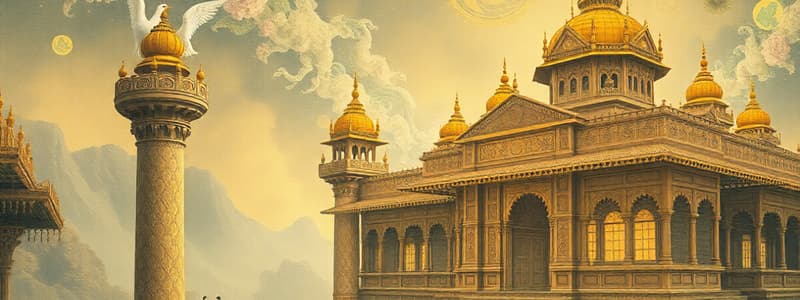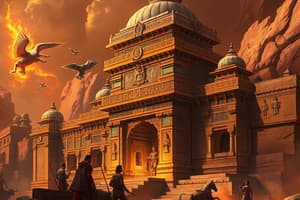Podcast
Questions and Answers
What strategic advantage did the Gupta Empire benefit from?
What strategic advantage did the Gupta Empire benefit from?
- Access to iron ore in central India (correct)
- Rich agricultural land in the north
- Control over maritime trade routes
- Monopolization of spice trade
Which title was adopted by Chandragupta II?
Which title was adopted by Chandragupta II?
- Maharajadhiraja
- Vikramaditya (correct)
- Samudragupta
- Rajadhiraja
What was significant about the Allahabad pillar inscription during Samudragupta's reign?
What was significant about the Allahabad pillar inscription during Samudragupta's reign?
- It commemorated Samudragupta's military victories. (correct)
- It listed the territories conquered by Chandragupta I.
- It confirmed the Gupta's trade routes.
- It detailed the financial balance of the empire.
Which ruler was referred to as the 'Napoleon of India'?
Which ruler was referred to as the 'Napoleon of India'?
Which group did the Gupta rulers likely descend from according to caste?
Which group did the Gupta rulers likely descend from according to caste?
What notable action did Chandragupta II take to expand the Gupta Empire through marriage?
What notable action did Chandragupta II take to expand the Gupta Empire through marriage?
Who was the court poet that documented Samudragupta's military exploits?
Who was the court poet that documented Samudragupta's military exploits?
During whose reign did the Chinese pilgrim Fa-hsien visit India?
During whose reign did the Chinese pilgrim Fa-hsien visit India?
Study Notes
Gupta Empire Origins
- Gupta Empire arose from the Kushan Empire.
- Initial Gupta territory: Uttar Pradesh and Bihar.
- Gupta's strategic advantages: access to iron ore and silk trade routes.
Chandragupta I
- First significant Gupta king, married a Lichchhavi princess from Nepal.
- Likely belonged to Vaishya caste, strengthened social standing through the marriage.
- He used the title "Maharajadhiraja," and started the Gupta era.
Samudragupta
- Son and successor to Chandragupta I, renowned military leader.
- Court poet Harishena documented his military triumphs.
- Allahabad pillar inscription (with Ashoka's inscriptions) details his conquests.
- Sri Lankan King Meghavarman reportedly sent a missionary for a Buddhist temple in Gaya.
- V. A. Smith referred to him as the "Napoleon of India."
Chandragupta II
- Expansion of the empire reached its peak during his reign.
- Increased empire through warfare and alliances.
- Married his daughter Prabhavati to a Vakataka prince, effectively gaining control of the Vakataka kingdom.
- He adopted the title "Vikramaditya," expanding Gupta influence.
- Chinese traveler Fa-hsien (399-414 AD) documented his findings in India during Chandragupta II's reign.
- Chandragupta II's court in Ujjain boasted notable scholars (navratnas): Kalidasa, Amarsinha, Harisena, Varahmihira, Vararuchi, Vetalbhatta, Sanku, Dhanvanti, and Kahapanaka.
Studying That Suits You
Use AI to generate personalized quizzes and flashcards to suit your learning preferences.
Description
Explore the rise of the Gupta Empire from the Kushan Empire, focusing on key figures like Chandragupta I, Samudragupta, and Chandragupta II. Learn about their contributions to the empire's expansion, military strategies, and cultural significance in India. Test your knowledge on this influential period in ancient history.




